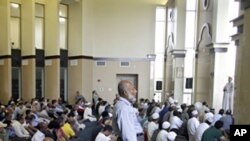A new survey finds that the number of U.S. mosques has grown dramatically in the decade since the September 11, 2001 terror attacks, despite protests against their construction and allegations they have promoted radicalism.
The survey is sponsored by the Council on American-Islamic Relations, the Islamic Society of North America and other groups in conjunction with the Hartford Institute for Religion Research, which tracks church membership and other aspects of religious life in the United States.
The survey's tally of 2,106 mosques marks a 74 percent increase since the year 2000, when
1,209 mosques were counted. It also found a trend among Muslim congregations toward suburbanization and integration into American life.
"The Muslim community in America is growing, healthy, vibrant, and becoming more and more a part of the American landscape," said Ihsan Bagby, a University of Kentucky Islamic Studies professor, a study co-author.
The mosque count was conducted in 2010 with follow-up interviews extending through 2011. New
States with the Greatest Number of Mosques
| 1 | New York: | 257 |
| 2 | California: | 246 |
| 3 | Texas: | 166 |
| 4 | Florida: | 118 |
| 5 | Illinois: | 109 |
| 5 | New Jersey: | 109 |
| 7 | Pennsylvania: | 99 |
| 8 | Michigan: | 77 |
| 9 | Georgia: | 69 |
| 10 | Virginia: | 62 |
York had the highest number of mosques, at 257, with California close behind at 246. But whereas in 2000 the Northeast was the region with the most mosques, the highest number a decade later was in the South.
Bagby said they have even been built in small cities in eastern Kentucky. "If the mountains of Kentucky can have mosques - and built mosques, built from the ground up - then you'll find mosques everywhere."
He said immigration and natural population growth gave impetus to the increase, along with the growing financial resources of American Muslims.
Two years ago, the proposed construction of a mosque near the site of the 2001 attacks in New York triggered a nationwide controversy and allegations that mosques were breeding extremists.
But 56 percent of mosque leaders told the survey that they put forward a flexible approach to the Quran, and to the sayings of the Prophet Muhammad, in order to take modern life into account.
And whereas in 2000 more than half of mosque leaders surveyed said they believed that "American society is hostile to Islam," but now, only a quarter do.
"What happened after 9/11 is that it pushed mosques out into the community," Bagby said in an interview. "And because of that experience - the wonderful experience of interfacing with neighbors and other interfaith groups in the locality - the churches and synagogues - it actually built a residue of sympathy and empathy with other religious people."
The study found that 2.6 million Muslims pray in a mosque for the Eid, a major holiday on the Islamic calendar. Some Muslim leaders said that figure suggests the total Muslim population in America is around seven million, significantly higher than other estimates.
David Roozen of the Hartford Institute said Islam is probably the fastest growing major religion in the country, but its influence is still limited.
"Islam in the United States, even with its rapid growth, is still probably two to four percent of the population."
Roozen has documented what he calls an "erosion of congregational vitality" in Christian denominations, but says their main concern should not be the growing number of mosques. He says it should be the 15 percent of non-religious Americans, who are the fastest growing group in major national surveys of all faiths.




